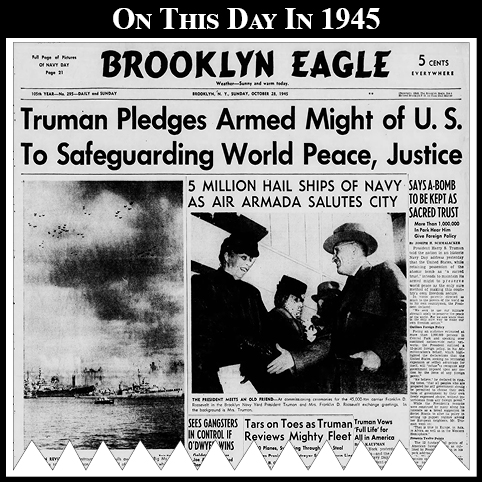October 28: ON THIS DAY in 1945, Truman pledges armed might of U.S. to safeguard world peace

ON THIS DAY IN 1923, the Brooklyn Daily Eagle reported, “With great simplicity and in the immediate presence of no more than 400 people who had known and loved him, the birthplace of Theodore Roosevelt, at 28 E. 20th St., was dedicated yesterday as Roosevelt House by the Women’s Roosevelt Memorial Association, the organization which has been responsible for the restoring and opening of this, another national shrine. At the time of this solemn dedication, one of the greatest Navy Day celebrations in the history of the service was in progress at the Brooklyn Navy Yard. And thus two monuments were brought at once into public view — the one the birthplace of a great man, the other the partial product of his national service.”
***
ON THIS DAY IN 1945, the Eagle reported, “President Harry S. Truman told the nation in an historic Navy Day address yesterday that the United States, while retaining possession of the atomic bomb as ‘a sacred trust,’ intends to maintain its armed might to preserve world peace as the only sure method of making this country’s own freedom secure … Facing an audience estimated at more than 1,000,000 persons in Central Park and speaking over combined nation-wide radio networks, the president outlined a 12-point foreign policy, in his administration’s behalf, which highlighted the declarations that the United States, seeking no territorial expansion or selfish advantage for itself, will ‘refuse’ to recognize any government imposed upon any nation by the force of any foreign power.’ ‘We believe,’ he declared in ringing tones, ‘that all peoples who are prepared for self-government should be permitted to choose their own form of government by their own freely expressed choice, without interference from any foreign power.’ While the president’s remarks were construed by many among his listeners as a broad suggestion to Soviet Russia to alter its policy in setting up puppet regimes among her European neighbors, Mr. Truman went on: ‘That is true in Europe, in Asia, in Africa, as well as in the Western Hemisphere.’”

Brooklyn Boro
View MoreNew York City’s most populous borough, Brooklyn, is home to nearly 2.6 million residents. If Brooklyn were an independent city it would be the fourth largest city in the United States. While Brooklyn has become the epitome of ‘cool and hip’ in recent years, for those that were born here, raised families here and improved communities over the years, Brooklyn has never been ‘uncool’.